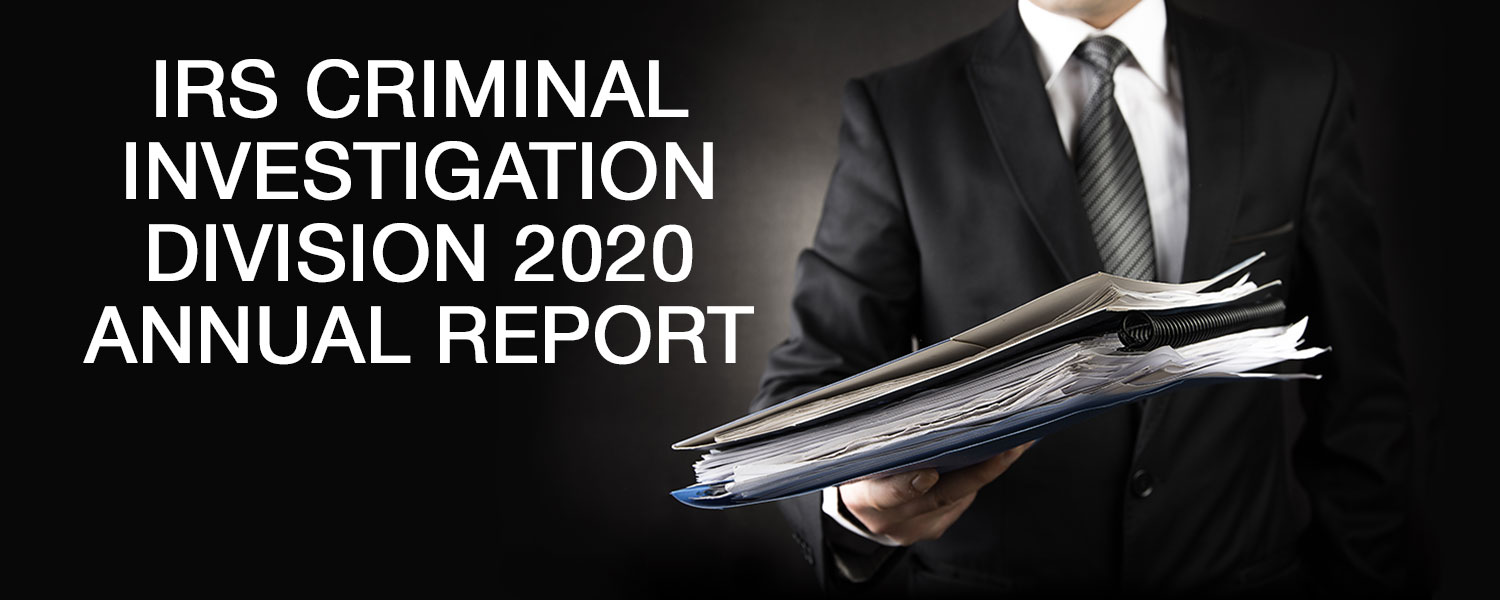IRS Criminal Investigation Division Releases Its 2020 Annual Report
On November 16, 2020 the IRS released the Criminal Investigation Division’s (CI) annual report, highlighting significant successes and criminal enforcement actions taken in fiscal year ending September 30, 2020. The IRS noted that a key achievement was the identification of over $10 billion in tax fraud and other financial crimes.
In issuing this report IRS Commissioner Chuck Rettig stated: “The special agents and professional staff who make up Criminal Investigation continue to perform at an incredibly high-level year after year. Even in the face of a global pandemic, the CI workforce initiated nearly 1,600 investigations and identified $2.3 billion in tax fraud schemes. This is no small feat during a challenging year, and their work is critical to protecting taxpayers and the integrity of our tax system.”
According to the report, CI initiated 1,598 cases in fiscal year 2020, applying approximately 73% of its time to tax related investigations. CI is the only federal law enforcement agency with jurisdiction over federal tax crimes achieving a conviction rate of 90.4% in fiscal year 2020.
The Special Agent’s Role In The IRS Criminal Investigation Division
An IRS Special Agent works for the CI. Special Agents are duly sworn law enforcement officers who are trained to “follow the money”. They investigate potential criminal violations of the Internal Revenue Code, and related financial crimes. Unless they are working undercover they will identify themselves with credentials which include a gold badge. The same gold badge appears on their business cards. Generally, IRS Special Agents travel in pairs if they are going to interview someone. One to conduct the interview, and the other to take notes, and act as a witness if necessary.
If you are contacted by an IRS Special Agent it is because he or she is conducting a CRIMINAL investigation. It is possible that the Special Agent is only interested in you as a witness against the target of the IRS investigation. However, it is a bad idea to speak to Special Agent without a criminal tax attorney present. IRS Special Agents are highly trained financial investigators. If you are the target or subject of an IRS criminal investigation you are not going to talk your way out of it, by “cooperating”; instead you may be giving the IRS more evidence to use against you.
Even if the IRS Special Agent tells you that you are only a witness you should still consult with an experienced criminal tax attorney BEFORE speaking with an IRS agent. If you make misstatements that you think put you in a better light you could change your role from a witness into a target. The best tactic is to simply tell the Special Agent that you are uncomfortable talking to him until you have had a chance to speak with your attorney. Then ask him for his business card. In this way your tax attorney can contact the Special Agent directly, and determine the best course of action.
There are a number of statutes in the Internal Revenue Code that authorize the federal government to prosecute individuals, including those dealing with tax evasion, fraud and false statements, failure to file returns, failure to pay tax, etc. Some, like the tax evasion statute, are worded in particularly broad terms and may ensnare the unwary or careless taxpayers.
If CI recommends prosecution, it will give its evidence to the Justice Department to decide the special charges. Individuals are typically charged with one or more of three crimes: tax evasion, filing a false return, or not filing a tax return. All of which are tax fraud.
Two Special Programs Run By CI
With the avalanche of billions of data flowing to IRS, CI has been running two special programs: the International Tax Enforcement Group (ITEG), and the Nationally Coordinated Investigations Unit (NCIU). Both focus on increasing the rate of taxpayer compliance with income reporting requirements contained in the Internal Revenue Code – particularly those pertaining to the disclosure of foreign financial accounts, reporting of virtual currency transactions, and reporting transactions involving cannabis.
What Should You Do?
Very quickly a criminal investigation can turn to the worst for a targeted taxpayer so you should promptly seek tax counsel who can act proactively before the IRS does. Let the tax attorneys at the Law Offices Of Jeffrey B. Kahn, P.C. located in Orange County (Irvine), San Francisco Bay Area (including San Jose and Walnut Creek) protect you from excessive fines and possible jail time. Also, if you are involved in cannabis, check out how a cannabis tax attorney can help you. And if you are involved in crypto currency, check out what a bitcoin tax attorney can do for you.




